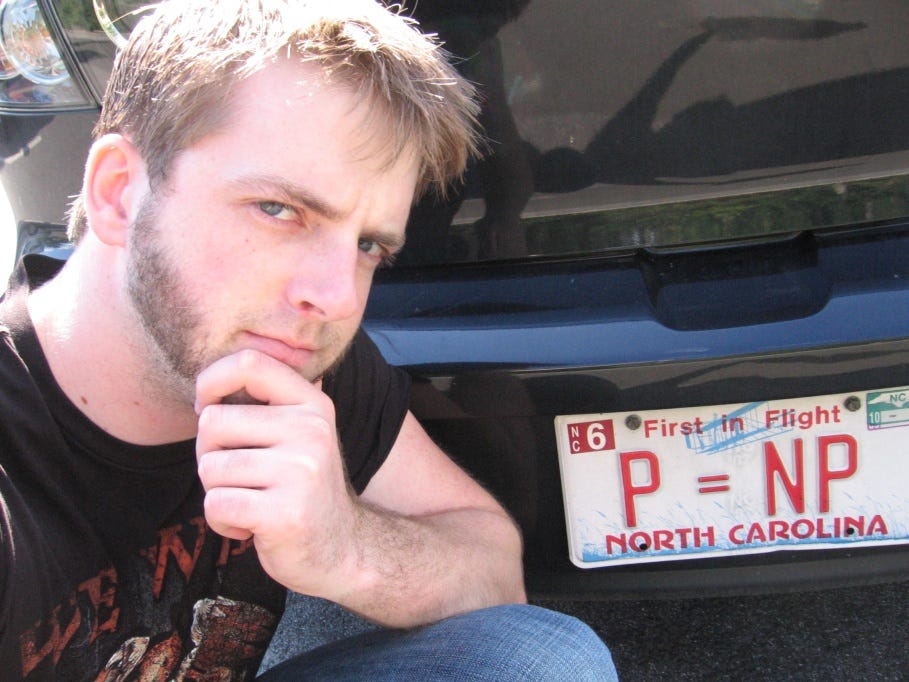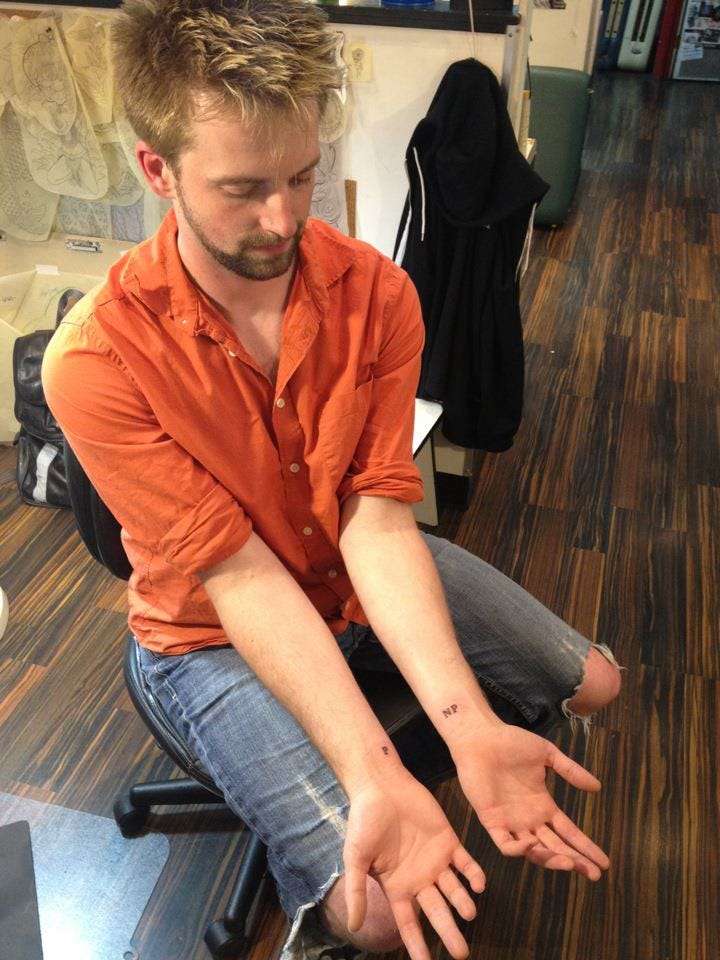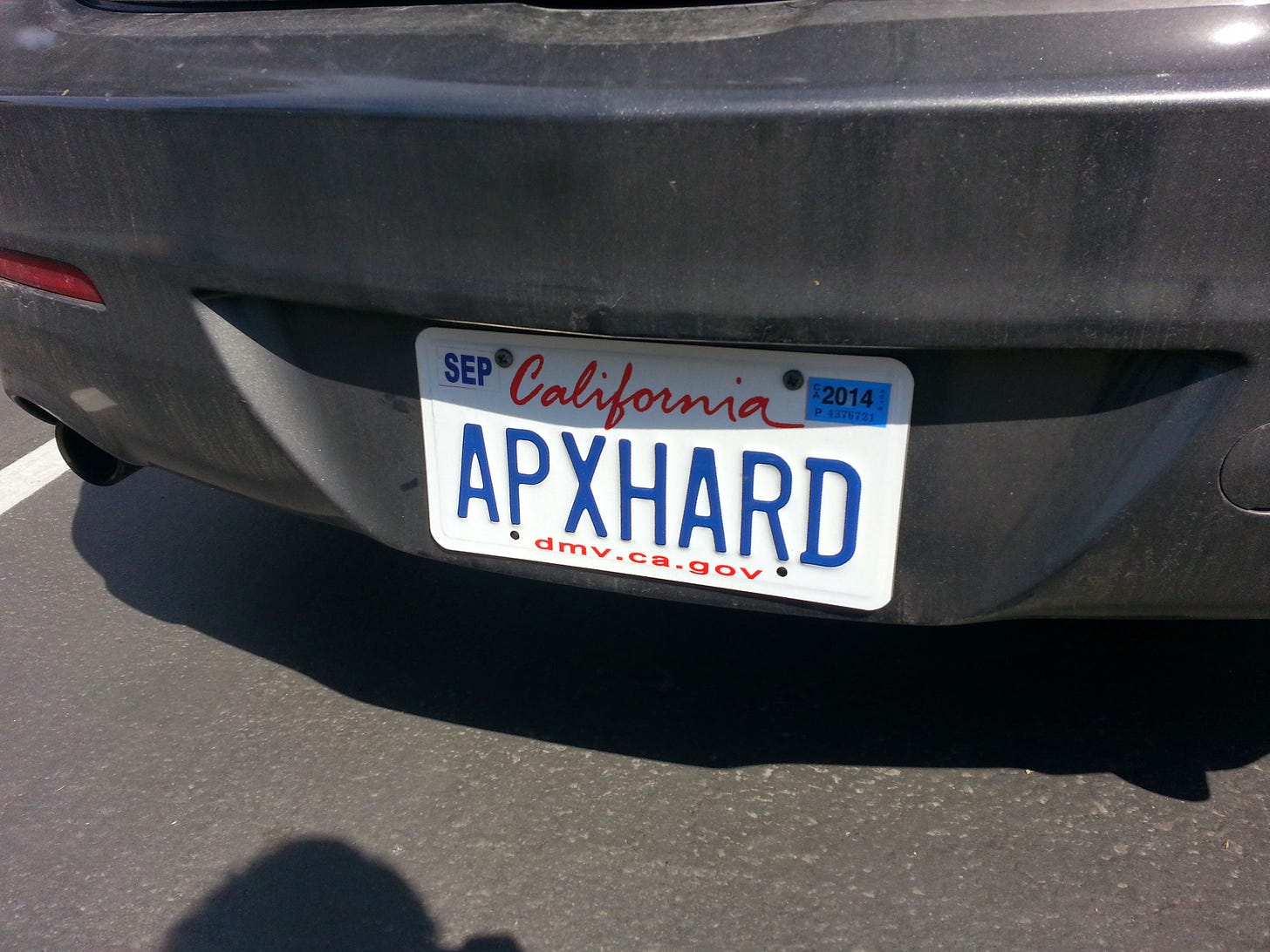P vs NP and the Question of God
An article-length response to a Vitalik Buterin Tweet from a guy with P / NP Tattoos
Today, Ethereum creator Vitalk Buterin asked his followers two seemingly unrelated questions:
This question was brought to my attention because a few people asked for my take, given my history of interest in P vs NP. I thought I’d share my answer here, for anyone interested, especially because the name of this substack comes from my thoughts on P vs NP.
I think both of these questions - “Does P equal NP” and “Is there a God?” deal with the fundamental nature of reality, of what is true and how we can know it, of identity, of choices, of values, and of how best to live our lives. How I arrived at that conclusion will take some unpacking. So let’s pull some items of experience out of the knapsack of memory.
If you want to know what P vs NP means, just read along as if you’re hearing about some fascinating character for the first time. She is mysterious, inviting, and deeply challenging all at once. Lots of men are obsessed with her. Lots of women, too. If you pursue her aggressively, she will humiliate you. If you listen to her, patiently, she will slowly share herself with you. She helped me through a real rough patch in my life, and has since become a constant companion through the years. I stopped trying to make her “mine” years ago by embracing the reality that she is far beyond me.
If you STILL want some technical definitions, ok, fine, read wikipedia.
The big question that many people have been asking is, “Is P the same as NP, or is NP far larger?”
From Arrogance to Humility by way of Computational Complexity
As a young man, I was convinced: P equaled NP.
This belief was primarily a result of arrogance and ‘stick it to the man’ type attitude. Most academic computer scientists were convinced that P was strictly contained in NP. Being an instinctive contrarian most of my life, this meant I figured P was really equal to NP but nobody had proved it yet.
I still remember the deeply counterintuitive result from my languages and automata class, that adding determinism to finite state automata doesn’t really change their computational power. It just felt wrong, but I could tell from the proofs that it was, ultimately correct. I repeatedly encountered intuition-violating truths in my high school and undergraduate education, leading to a deep distrust of my intuition as a valid source of truth. If I knew I couldn’t prove something, I refused to believe it.
Of course, I still believed all kinds of things I could not prove - I simply wasn’t aware of them as beliefs, and so never considered whether I should question them. I doubted every belief that arose in my awareness, and thought there was nothing left.
My interest in P vs NP arose at a time when I grew increasingly to believe that the world was made of lifeless bits of stuff following bizarre mathematical rules with no real purpose whatsoever. My brain was just a mess of chemicals zapping each other for no reason other than doing so worked for my ancestors, who only believed what they did because science wasn’t a thing back then. Life was meaningless and only overly credulous people thought otherwise. I thought I was too smart for that.
Once I started using cannabis on a regular basis, and then after an experience with psilopsybin mushrooms, I started to consider the possibility that maybe I was missing something important about life.
Other people are a thing
The woman who is now my wife and the mother of my children once told me, after breaking up with me, “If you can’t think about things from other people’s perspective, you’re going to have a very difficult life.” At that time, this felt to me like the kind of thing that simply didn’t compute.
It was actually the P vs NP question that brought me to better understand other people.
During a phase of my life where I was using drugs and open to just about any idea, as long as it didn’t sound like something my ancestors would have agreed to, I encountered the idea that beauty is a reliable guide to truth. I figured I’d try this idea on, so I tried asking myself what as more beautiful, a world where P equaled NP, or a world where NP was much greater than P?
The result was wilder than a mushroom trip. If P really does equal NP, then it means, among other things:
almost all online encryption systems are broken, and if you’re clever enough, you can exploit them secretly to become wealthy and powerful
there’s no real difference between being able to appreciate something beautiful and being able to create it yourself
In short, a world where P = NP is a world where you are all alone, and you’d better be a genius, because if you’re not the smartest person in the universe, you’re at the whim of whoever is. This is a world where stable identity is itself a kind of fiction because nobody can prove they are the same person they were a few weeks ago. The concept of a cryptographic identity is not meaningful in this world, and there’s little difference between a brain in a jar and a sever in a closet somewhere; both depend on signals from an outside world.
Meanwhile, a world where P != NP is a world where:
having lots of friends acts like a kind of superpower because they can share good ideas with you, and you can validate them, much more easily than you can find good ideas on your own
building relationships and understanding other people is far more effective as a strategy than trying to go it alone
Somehow, being told by a super hot, brilliant young woman “you need to think from other people’s perspectives” didn’t get through to me. But asking, “which hypothetical universe is more beautiful” somehow did.
Suddenly, an entire class of nightmares I used to have, all made sense. In one typical example, I’m skiing with my friends. You have to pay to go up a ski lift, and you’d get a refund for going down some less popular runs. Instead of just enjoying time with my friends, I was worried about keeping the entire group on budget. Or, I’m about to go on vacation, but I can’t figure out what to pack. My family is about to leave without me, and I’m frantically sorting through items trying to figure out which elements fit into the suitcase.
These situations are both ‘NP complete problems’ . These problems - of assigning people to ski lifts and routes, or selecting which items to pack can only be efficiently solved if P = NP.
Intuitively, I was ignoring the people around me so that I could fixate on mathematical problems that were ultimately not that important. I ‘beat’ these nightmares simply by recognizing what was happening and choosing to just ignore the problem; go without the suitcase, go down whatever ski slope I wanted. The answer was, forget this problem, just go be with your friends and family and people who love you.
In my own mind, NP came to symbolize the right brain, intuition, holism, other people, connectivity, the power of emotion, of presence, of recognizing what is good right in front of me. P came to symbolize the left brain, discrete logic, chopping the world up into bits and trying to arrange them just so. Quite a useful trick to have at times, but nothing to get carried away with. “Converting” to believe that P != NP came to mean, to me, trusting my intuition and my friends to be more valuable than me reasoning alone. This left brain / right brain asymmetry is explored further in the book The Master and His Emissary
As a result of this association between the two hemispheres of my brain and two very different ways of thinking just over ten years ago, I got myself this tattoo:
The purpose of this tattoo was to remind myself to stop living in the left hemisphere all the time, stop chopping the world up into discrete bits so I could arrange them just so, and instead, learn to let go, relax, trust myself and the people around me to work things out on their own.
Of course, I needed that reminder a LOT because my mentality was still very much based on this idea of, I have to be a badass, because if I’m not, life will crush me.
Around this time I started using the handle APXHARD, the name of this substack, as a kind of boast: “I’m so unique and special, even approximating me would be NP-HARD.” This is ultimately still a kind of arrogance, but I like the name so I’ve kept it.
I’ve also kept on trying to integrate the meaning of P != NP into my life.
Recognition, Not Search
Are you searching for peace? Joy? Happiness?
What if I told you that you were already at peace merely by virtue of the fact that you aren’t currently prying your eyes out of your skull with salad forks in an attempt to make all the hurt of being alive just stop?
Sure, maybe you don’t’ feel at peace with the world, but what if those feelings are ultimately an incorrect assessment of how you truly feel, because you can’t recognize your deepest feelings underneath layers of intense fear and desire?
If you don’t feel at peace right now, how much of that is changeable by modifying the outside world? How much is changeable by increasing your capacity to appreciate and enjoy what is happening right around you? Dopamine - a neurotransmitter that drives external reward seeking - doesn’t work as an approach for reliably making you feel better, but serotonin - a neurotransmitter released when you appreciate the present rewards right in front of you - is really swell. Especially when coupled with other neurotransmitters like endorphins from exercise and Oxycontin from skin-to-skin contact with someone you love.
P != NP came to mean, to me, that searching for things isn’t nearly as effective as just recognizing them right in front of me. The P approach to life is to try and figure it all out in advance; the NP approach is to take steps based on nothing but intuition, and just trust myself to recognize when things work out and when they don’t. The P approach is to theorize endlessly about the optimal path before stepping out the door; the NP approach is to try one experiment, learn from that, and then try another.
I can accept now that I’m not going to figure everything out, that I don’t need to, that it’s fine, and that I am fine, because I am part of something bigger, better, wiser and older than myself. This has been a long journey for me, but I’m now at a place where yes, I believe in God. All this really means is, I believe that ultimate reality is fundamentally good, that I can come to better understand ultimate reality through a process of trust-based exploration, experimentation, and reflection, and that developing healthy relationships with lots of people works far better than trying to understand and control everything around me in detail.
And so the story ends with one final shot of where I am now - believing that I already have everything I need, I just haven’t fully recognized it yet.
I am NP-COMPLETE.








Great essay. I'll have to ponder it more to fully digest it.